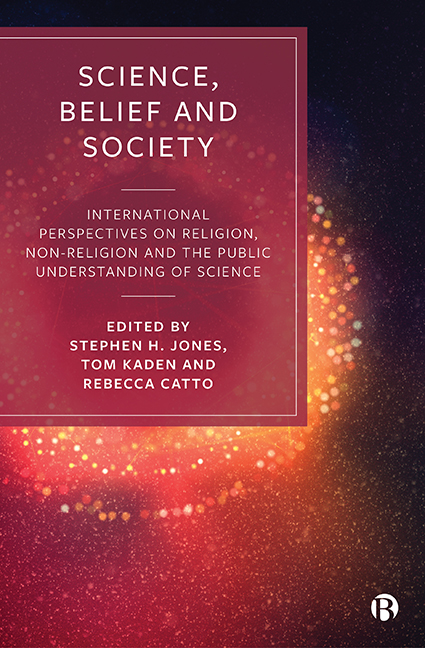 Science, Belief and Society
Science, Belief and Society Published online by Cambridge University Press: 27 April 2022
Introduction
This chapter provides a critical overview of quantitative surveys and qualitative research on Muslim publics’ understandings of, and attitudes to, evolutionary science. This topic has received increasing attention over the past decade at the margins of science and technology studies, especially in the overlapping fields of the public understanding of science (PUS), science communication and science and society. Research into publics’ understanding of science typically crosses over a number of research fields and includes data collected by special interest groups (eg science policymakers and educators). This is especially the case for research into Muslims’ understanding of science, which is often found in studies interested primarily in the role of religion in society. Our review thus incorporates small-sample, interview-based qualitative studies and larger quantitative surveys across many related fields. In what follows, however, we pay particular attention to how Muslim acceptance of evolution features in PUS.
As a field of study, PUS has well-established lexicons, research questions and hypotheses for investigating publics’ attitudes to evolution. In Muslim contexts, despite the limited number of empirical studies, there is an entrenched assumption in PUS research that the rejection of evolutionary science by Muslims is a widespread problem resulting from these publics’ faith in Islam. This chapter considers the assumptions underpinning most research, discusses the limits that this imposes on findings and highlights the insights brought by some studies adopting an open, exploratory approach to Muslim experiences and opinions. Most existing studies have serious shortcomings: foregrounding an essentialized Islam; ignoring plurality and diversity across different societies; and ignoring the lived experiences of being Muslim. In conclusion, we suggest ways of dealing with these issues and improving research on Muslim publics’ understandings of evolutionary science.
The importance of knowledge deficits in PUS research on biological evolution
Since the 1980s, as public attitudes towards biological evolution became subject to growing scrutiny, PUS and latterly science and society research has been allied with the mainstream scientific community in assuming that public acceptance of evolutionary science is important, or, indeed, a form of social good. This project is rooted in a foundational assumption in facets of PUS literature that the relationship between science and society is fractured (Bodmer, 1985; Suldovsy, 2016).
To save this book to your Kindle, first ensure no-reply@cambridge.org is added to your Approved Personal Document E-mail List under your Personal Document Settings on the Manage Your Content and Devices page of your Amazon account. Then enter the ‘name’ part of your Kindle email address below. Find out more about saving to your Kindle.
Note you can select to save to either the @free.kindle.com or @kindle.com variations. ‘@free.kindle.com’ emails are free but can only be saved to your device when it is connected to wi-fi. ‘@kindle.com’ emails can be delivered even when you are not connected to wi-fi, but note that service fees apply.
Find out more about the Kindle Personal Document Service.
To save content items to your account, please confirm that you agree to abide by our usage policies. If this is the first time you use this feature, you will be asked to authorise Cambridge Core to connect with your account. Find out more about saving content to Dropbox.
To save content items to your account, please confirm that you agree to abide by our usage policies. If this is the first time you use this feature, you will be asked to authorise Cambridge Core to connect with your account. Find out more about saving content to Google Drive.